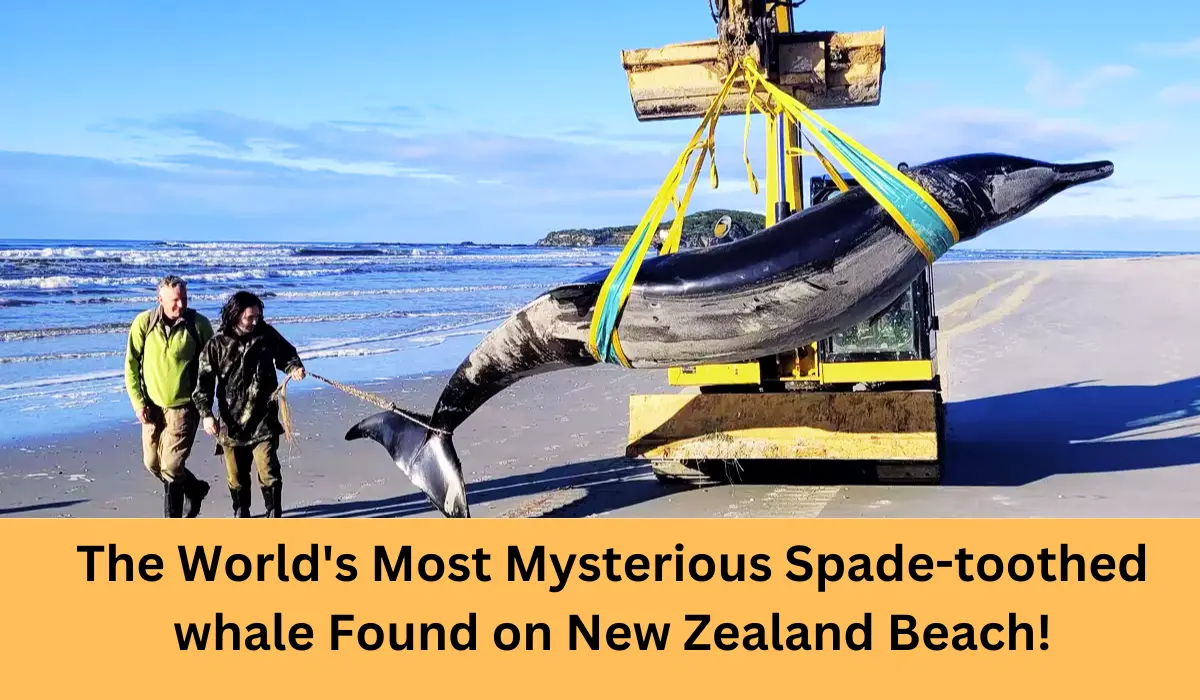Introduction
New Zealand has unveiled another marine marvel with the recent discovery of a spade-toothed whale in southern Otago. This rare and enigmatic creature, identified by researchers, washed ashore near a river mouth, marking a significant event in marine biology. Gabe Davis from the Department of Conservation emphasized its rarity, noting that only six specimens have been recorded worldwide since the 1800s, most from New Zealand. This discovery offers a rare opportunity to study the spade-toothed whale, one of the least known large mammals of modern times.
First described in 1874, the species remains elusive, with no live sightings ever recorded. The whale’s body is now in cold storage, and DNA samples are being analyzed at the University of Auckland. Previous discoveries include a mother and calf in 2010 and another specimen in 2017, highlighting the species’ scarcity. The current find could lead to international cooperation for conservation efforts, as understanding this mysterious species better could help protect it. This discovery underscores New Zealand’s crucial role in marine conservation and the need for global efforts to safeguard these rare creatures.
Discovery of the Spade-Toothed Whale
On July 4, government researchers made a groundbreaking discovery near a river mouth in Otago. The bones of an unknown creature, measuring five meters (16.4 feet) long and featuring a distinct beak, were found. Initial identification by marine mammal experts from the Department of Conservation (DOC) and Te Papa National Museum suggested it was a male spade-toothed whale. To confirm this rare find, scientists have initiated DNA testing.
Significance of the Discovery
Gabe Davis, Coastal Otago Manager for the DOC, highlighted the rarity of the spade-toothed whale, stating, “Since the 1800s, only six specimens have been recorded worldwide, and all but one of these were from New Zealand.” The discovery is monumental from both scientific and conservation perspectives. It provides a rare opportunity to study a species that remains one of the least known large mammals of modern times.
A Rare Glimpse into the Unknown
The spade-toothed whale, Mesoplodon traversii, was first described in 1874 based on a lower jaw and two teeth collected from the Chatham Islands. Since then, only a handful of specimens have been found, with no live sightings ever recorded. The scarcity of these finds has led to the species being classified as “data deficient” under New Zealand’s threat classification system.
Previous Discoveries
The first intact specimen, a mother and calf, was stranded in the Bay of Plenty in 2010. This find was significant as it provided the first complete look at the species. Another specimen was added to the collection in 2017 after a stranding in Gisborne. These rare occurrences highlight the elusiveness of the spade-toothed whale and the importance of each new discovery.
Copa America Final: Messi’s Painful Farewell, Argentina’s Happiness Overflows
Current Research and Future Implications
The recently discovered whale’s body has been placed in cold storage, and genetic samples have been sent to the University of Auckland for analysis. This process could take weeks or even months, but it is crucial for confirming the whale’s identity and understanding more about its genetic makeup. The rarity of the spade-toothed whale also raises questions about international cooperation and conservation strategies.
Conservation Challenges
With so few specimens available, the spade-toothed whale poses a unique challenge for conservationists. The lack of live sightings and limited data make it difficult to develop effective conservation strategies. However, each new discovery brings hope and an opportunity to learn more about this mysterious species.
Star-Studded Night: Inside Michael Rubin White Party
Global Significance
The spade-toothed whale’s rarity and the limited number of specimens found have made it a subject of international interest. Negotiations and collaborations between countries are essential to ensure the species’ preservation. The discovery also underscores the importance of marine conservation and the need to protect the habitats of these elusive creatures.
Conclusion
The discovery of the spade-toothed whale on New Zealand’s beach is a remarkable event that has captured the attention of the scientific community worldwide. It offers a rare glimpse into the life of a species that remains shrouded in mystery. As researchers continue to study the whale’s DNA and physical characteristics, we can hope for new insights that will help protect and preserve this rare marine mammal.

